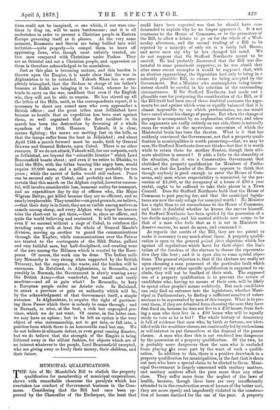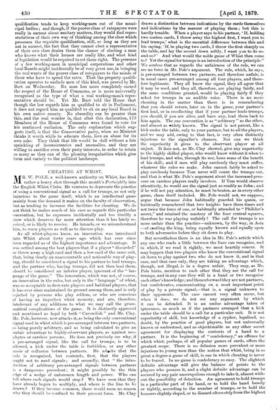MUNICIPAL QUALIFICATIONS. T HE fate of Mr. Mundella's Bill to abolish
the property qualification for membership of municipal corporations, shows with remarkable clearness the paralysis which has overtaken the conduct of Government business in the Com- mons. Considering that the Bill had once been ap- proved by the Chancellor of the Exchequer, the least that could have been expected was that he should have con- descended to explain why he no longer approves it. It is not courteous to the House of Commons, or to the promoters of the Bill, to allow a debate to go on for the whole of a Wed- nesday afternoon, and the second reading of a Bill to be rejected by a majority of only six in a fairly full House, and never once say why he has changed his mind. We do not suppose that Sir Stafford Northcote meant to be uncivil. He had probably discovered that the Bill was dis- tasteful to some prominent supporter, or he was afraid that after some recent examples it would be supposed that, with an election approaching, the Opposition had only to bring in a tolerably plausible Bill, to ensure its being accepted by the Government. But a Minister who contemplates being incon- sistent should be careful in his selection of the surrounding circumstances. If Sir Stafford Northcote had made out a plausible case for postponing the consideration of the Bill, or if the Bill itself had been one of those doubtful measures the argu- ments for and against which seem so equally balanced that it is almost impossible to say which predominates, no one would have cared about his change of purpose. But when the change of purpose is accompanied by no explanation whatever, and when the arguments are really entirely on one side, there is naturally room for wonder at the mysterious conversion of which the Ministerial brain has been the theatre. What is it that has suddenly convinced the Government, not that a property quali- fication in municipalities is worth preserving—that, we may be sure, Sir Stafford Northcote does not think—but that it is worth while to retain them for another Session, though their ulti- mate abolition is assured ? It adds a little to the absurdity of the situation, that it was a Conservative Government that abolished the property qualification for Members of Parlia- ment, so that the Leader of the House appears to think that though anybody is good enough to enter the House of Com- mons, only men whose respectability is warranted by the pos- session of £1,000, or the occupancy of a house of £30 a year rental, ought to be suffered to take their places in a Town Council. Does Sir Stafford Northcote hold that the House of Commons is past praying for, and that the municipal legisla- tures are now the only refuge for moneyed worth ? No Minister has a right thus to set conundrums to the House of Commons, and leave it doubtful whether he knows the answer himself.
Sir Stafford Northeote has been spoiled by the possession of a too docile majority, and his mental attitude now seems to be that of a man who feels that as it is not in Ministers to deserve success, he must do more, and command it.
As regards the merits of the Bill, they are too patent to make it necessary to say much about them. A property qualifi cation is open to the general prima facie objection which lies against all regulations which have for their object the limi- tation of the freedom of the electors to choose the representa- tive they like best ; and it is open also to some special objec- tions. The general objection is, that if the electors are really set upon choosing a man possessed of the particular fault which a property or any other specific qualification is supposed to ex- clude, they.will not be baulked of their wish. The supposed use of a property qualification is to prevent the return of candidates who, having no means of their own, will be likely to spend other people's means recklessly. But such candidates can only find an entrance into the legislature, whether Muni- cipal or Parliamentary, by finding a sufficient number of voters anxious to be represented by men of this temper. What is to pre- vent them, if they are debarred from choosing the man they have first fixed on, because he does not live in a £30 house, from find- ing a man who does live in a £30 house who will be equally ready to vote as he is bid The whole history of democracy is full of evidence that men who, by birth or fortune, are iden- tified with the wealthier classes, are continually led by enthusiasm or self-interest to put themselves at the disposal of the poorer classes. A man who does this is not rendered less dangerous by the possession of a property qualification. Of the two, he is probably more dangerous than the man who is excluded from playing the same part by the want of such a qualifi- cation. In addition to this, there is a positive drawback to a property qualification for municipalities, in the fact that it shuts out men who have a special claim to be elected to them. Muni- cipal Government is largely concerned with sanitary matters, and sanitary matters affect the poor more than any other class. They suffer more from the neglect of the laws of health, because, though these laws are very insufficiently attended to in the construction even of houses of the better sort, they are more openly and impudently violated in the construc- tion of houses destined for the use of the poor. A property qualification tends to keep working-men out of the muni- cipal bodies ; and though, if the poorer class of ratepayers were really in earnest about sanitary matters, they would find repre- sentatives of their own way of thinking among the class which possesses the requisite qualification, still, so long as they are not in earnest, the fact that they cannot elect a representative of their own class denies them the chance of electing a man who knows what their houses are really like, and what kind of legislation would be required to set them right. The presence of a few working-men in municipal corporations and other local Boards might incidentally be of very great use, in bringing the real wants of the poorer class of ratepayers to the minds of those who have to spend the rates. That the property qualifi- cation operates to exclude men of this kind, was proved by Mr. Burt on Wednesday. No man has more completely earned the respect of the House of Commons, or is more universally recognised as the type of what a real working-man's repre- sentative should be. Yet Mr. Burt told the House that though the law regards him as qualified to sit in Parliament, it does not regard him as qualified to sit on any local Board in his own native county. No absurdity can be greater than this, and the real wonder is, that after this declaration, 173 Members of the House of Commons were found to vote for his continued exclusion. The only explanation which sug- gests itself, is that the Conservative party, when no Minister thinks it worth while to educate them, love an abuse for its own sake. They think that life would be dull without a fair sprinkling of inconsistencies and anomalies, and they are willing to sacrifice even their party interests, in order to retain as many as they can of the pleasing irregularities which give form and variety to the political landscape.



































 Previous page
Previous page